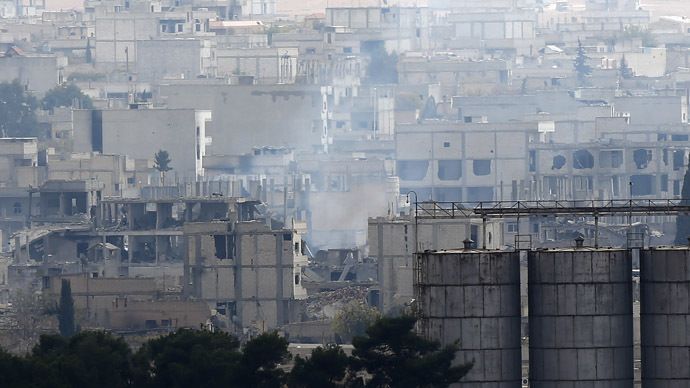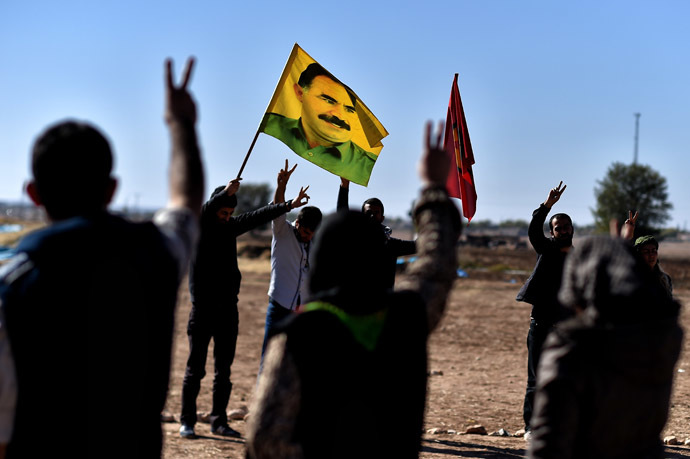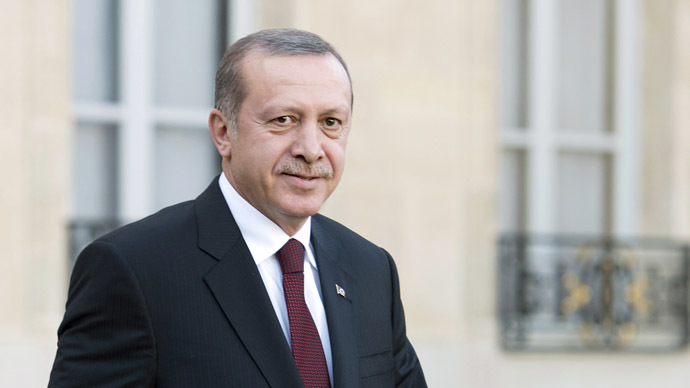‘Kobani- battle between good and evil’

Presenting the clashes in Kobani as a battle between good and evil where the Kurd good guys are fighting against the fundamentalist Islamists, western media helped the Kobani fighters reach their goals, Firat Demir from the University of Oklahoma told RT.
RT:The battle in Kobani is still going on. What is the media attitude to the situation?
Firat Demir: The battle in Kobani has been continuing and I wouldn’t say that there is a loss of attention from the media but there is a sense of relief that the war is over in Kobani which might be the case. Given that the attention was at its peak from the Western media in the US and Europe, and twitter accounts were full of tweets about Kobani and what was happening there, with TV…about the battle there, it was pretty much represented as the battle between good and evil - which I think was the case. Resembling the battles from “The Lord of the Rings,” the serial: the good guys, the Kurds, were fighting against the fundamentalist Islamists.
And it had an effect in terms of what it brought to the table. If you look at the gains that the Kobani fighters, defenders managed since then, it is significant. A: They managed to put pressure on Turkey through international media to open up the borders to allow Kurdish fighters from Iraqi Kurdistan to bring support and help to Kobani, because Kobani is an enclave. It is in Northern Syria bordering Turkey; it is disconnected from the rest of Syrian Kurdistan, which Kurds call Western Kurdistan. So, Rojava and Kobani are parts of the same canton system, but they have no border connection. Rojava on the north-east side of Syria has a border with the Iraqi side which was disconnected by Iraqi Kurdistan. The [Masoud] Barzani government didn’t like Kurds forming an alternative rival group … Iraqi Kurdistan is mostly ruled by two parties: the party ruled by Barzani and former President of Iraq, [Jalal] Talabani, as opposed to Syrian Kurdistan which is party-controlled, affiliated with the PKK [ Kurdistan Workers' Party], and the PYD (the Democratic Union Party).

The Kurds in Iraq, or the Barzani government, saw this is a rivalry or a power contest. So they blocked the border with Syrian Kurdistan and they did not provide any strategic ammunition or any other logistical support to the Kurds up until the battle in Kobani became international news. Once it became international news it put pressure on the Turkish governments to do something about it because the international news crews and media were watching literally over a hill looking at Kobani. Because these borders don’t mean much for Kurds… From the Turkish side you can watch everything happening in the Syrian side of Kobani. So Turkey had to agree to open up the border.
RT:How did media coverage influence the actions of the Turkish government in the region?
How did that happen: negative publicity from the international media showing that Turks were doing nothing, that they were facilitating the passage of guns and manpower for ISIS, for the Islamists ... All these fighters on the ISIS side passed through Turkey. And there is credible evidence that Turkey has done more than just letting them pass through in the form of logistical support, guns and so on. Secondly, Turkey had to allow the fighters from the Iraqi side to pass through which wouldn’t happen if Iraqi Kurdistan did not feel the pressure from the international community, also from the Kurdish themselves. Here is the situation: you have Kobani with a couple of hundred fighters resisting for weeks against much a better armed and stronger force trying to annihilate them from the face of the Earth. And you have … Kurds in Turkey watching this every day, and they have their brothers and sisters fighting. And Kurds in Iraq are doing nothing about it. What’s even worse – they are blocking the border.

It put a significant pressure on the Barzani government to do something and help the brother Kurds in Syria. And with this agreement with Turkey they managed to bring Peshmerga forces with fresh ammunition and guns that can match the ones that are available to ISIS. Because the ones that ISIS has been using are first quality ammunition and guns mostly stolen from the Iraqi army, they are manufactured in the US. And the guns that Syrian Kurds in Kobani had were very light weaponry like Kalashnikov or very simple assault weapons instead of having tanks or missiles.
Once you opened the border and help started coming in from the Iraqi side, and also hundreds of Kurds from Turkey wanted to join and support the PWG (People’s War Group) fighters in Kobani, it brought a split up in Kobani and ISIS went on the run. At the moment ISIS is at the outskirts of the town, they have lost allies in terms of manpower and prestige. Kurds are the opposite - they are on the winning side.
The statements, views and opinions expressed in this column are solely those of the author and do not necessarily represent those of RT.
The statements, views and opinions expressed in this column are solely those of the author and do not necessarily represent those of RT.












